|
|
|
Sort Order |
|
|
|
Items / Page
|
|
|
|
|
|
|
| Srl | Item |
| 1 |
ID:
161133
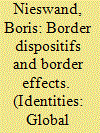

|
|
|
|
|
| Summary/Abstract |
The article argues that transnationalism and border studies offer complementary perspectives where each can inspire the other. Based on two case studies, the notions of border dispositifs and border effects are developed as analytical lenses for researching and conceptualising the nexus between transnational migration and border regimes. While the border dispositifs perspective facilitates a de-reification of borders and shifts the focus on how inequalities are produced by specific border locations and situations, the border effects perspectives reifies the notion of border in order to capture structural effects which border regimes have on transnational migrants’ lives. Finally, the article introduces the notion of border capital to theorise effects that borders have on resources of persons who are mobile across borders. It aims at capturing the impact of borders on inequalities between mobile and sedentary persons.
|
|
|
|
|
|
|
|
|
|
|
|
|
|
|
|
| 2 |
ID:
164990
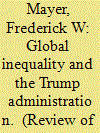

|
|
|
|
|
| Summary/Abstract |
Since US President Donald J. Trump took office in January 2017, the future of the global economy has looked distinctly uncertain. This is not because a process of clear and purposeful change can be said to be underway. Instead, it is because of a pattern of piecemeal, inconsistent and contradictory fragments of policy, both domestic and international in orientation, in the arenas of trade, taxation, business relations, finance and banking, social and welfare provision, immigration, and environmental protection, whose cumulative significance remains unclear. The modest task of this essay is therefore to sketch the contours, patterns, inconsistencies and confusions presented by the Trump administration's approach to shaping the US economy and, by extension, the global economic order, and on that basis to offer an interpretation of its emerging implications for inequality both within the United States and across the world.
|
|
|
|
|
|
|
|
|
|
|
|
|
|
|
|
| 3 |
ID:
173904
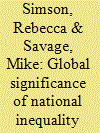

|
|
|
|
|
| Summary/Abstract |
Since the 1980s, inequality has been rising in Europe, North America and parts of Asia. How does our understanding of global inequality dynamics change if coverage is extended to the rest of the developing world? To rebalance the perspective on global inequality trends, this paper surveys data and literature on recent inequality trends in Latin America, Asia, Africa and the Middle East. It finds that in these regions there are more countries with falling than rising inequality over the past 20 years, as measured by Ginis of income or consumption inequality. At the global level, therefore, there are signs of inequality convergence, as inequality has been falling in countries with high inequality in the 1990s (particularly Latin America), and rising in historically low-inequality countries. We discuss the political and economic drivers of inequality decline in countries with a steady fall in the Gini. This suggests some common trends across the globe, including the role of democratisation, the rise of new social movements, and the expansion of education and social safety nets and favourable commodity prices, in reducing income disparities. This paper calls for more country-level comparisons of inequality trends, to highlight the multiplicity of paths in this latest phase of globalisation.
|
|
|
|
|
|
|
|
|
|
|
|
|
|
|
|
| 4 |
ID:
103606
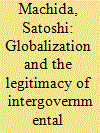

|
|
|
| 5 |
ID:
113092
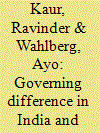

|
|
|
| 6 |
ID:
142690
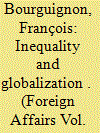

|
|
|
|
|
| Summary/Abstract |
When it comes to wealth and income, people tend to compare themselves to the people they see around them rather than to those who live on the other side of the world. The average Frenchman, for example, probably does not care how many Chinese exceed his own standard of living, but that Frenchman surely would pay attention if he started lagging behind his fellow citizens. Yet when thinking about inequality, it also makes sense to approach the world as a single community . accounting, for example, not only for the differences in living standards within France but also for those between rich French people and poor Chinese (and poor French and rich Chinese).
|
|
|
|
|
|
|
|
|
|
|
|
|
|
|
|
| 7 |
ID:
118024
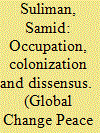

|
|
|
|
|
| Publication |
2013.
|
| Summary/Abstract |
In spite of a set of central unifying claims, the Occupy movement has generated a powerful challenge to the hegemonic politico-economic order through the expressive and transgressive act of occupation. Through such an act, occupy (verb) has become transformed into Occupy (noun): a resistance politics concerned with (re)claiming physical spaces and creating representational spaces. Following on the heels of the popular uprisings characterized as the 'Arab Spring', Occupy seemed to represent - even embody - the moment of democratic reflexivity where, if only just for a moment, the cracks in the façade of liberalism opened up just a little further, exposing the bonds between the decades-old frustrations of postcolonial subjects and the shattered hopes of democratic citizens. Occupy irrupted into the sacred space of global capitalism, and spread from Lower Manhattan to town squares and city centres the world over.
|
|
|
|
|
|
|
|
|
|
|
|
|
|
|
|
| 8 |
ID:
149436
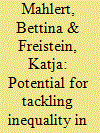

|
|
|
|
|
| Summary/Abstract |
The recently passed Sustainable Development Goals (SDGs) encompass a variety of explicit and implicit goals that address inequality. Although formulations remain vague and targets abstract, the SDGs go much further than previous development goals in addressing inequality as a central issue. Against the background of insights from inequality research, the article assesses their potential to become discursive resources for fundamental reforms of established development ideas.
|
|
|
|
|
|
|
|
|
|
|
|
|
|
|
|
| 9 |
ID:
116851
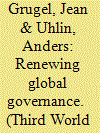

|
|
|
|
|
| Publication |
2012.
|
| Summary/Abstract |
Global inequality is increasing. Global inequalities are an expression of global social injustices and 'pathologies of power'. Global governance has been posited as a way forward. However, global governance will not deliver justice unless it embraces a more radical vision of what justice means and permits the voices of the marginalised to be heard in spaces of decision making. We identify two important approaches to building more just forms of global governance: the civil society approach, which is useful when it draws attention to the agency of those at the margins of global circuits of power; and the rights-based approach, which can provide opportunities for justice claims by marginalised groups.
|
|
|
|
|
|
|
|
|
|
|
|
|
|
|
|
| 10 |
ID:
123584


|
|
|
|
|
| Publication |
2013.
|
| Summary/Abstract |
This article employs the neo-Ricardian concept of quasi-rents - temporary above-market returns - to vindicate the structuralist claim that patterns of international order are shaped by global inequality and the transnational division of labour. Developing a framework linking the distribution of quasi-rents within the global economy to the process of class formation, the article examines the implications for the influential 'social market democracy' explanation of the democratic peace. It argues that the democratic peace is in part predicated on the quasi-rents enjoyed by substantial sections of the workforces of the 'core' advanced industrial states. Such a political economy provides the foundations for a 'social market democracy' in which economic security can be enjoyed by substantial sections of the population, giving rise to the system of values on which the democratic peace rests. Thus, present patterns of international order result from a historically specific unequal distribution of quasi-rents within the world economy.
|
|
|
|
|
|
|
|
|
|
|
|
|
|
|
|
|
|
|
|
|